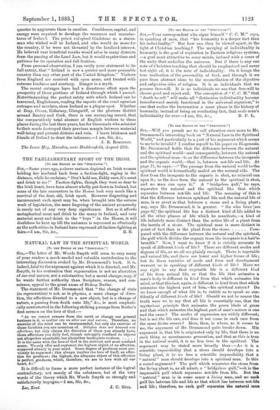"THE SUCCESS AND FAILURE IN IRELAND." (To THE EDITOR Or
TH3 "SPECTATOR."] Sra,—In your suggestive article of last Saturday, "The Success and Failure in Ireland," you state that "A great many of them [holdings] are held by tenants who are quite satisfied at present, and do not wish their rent revised by a Court of any, kind." A recent visit to Ireland, where I have mixed with alk sorts and conditions of men, fully verifies this statement. Just. now I have corroboration of it within my personal cognisance.
A hard-working Irishman living in the county of Sligo comes to work for me annually during the summer months. He has a. farm of several acres, for which and hi a dwelling he pays fl per annum. He expresses himself perfectly satisfied with his landlord and the rent. Now, this man has a wife and eight children, and to eke out a bare subsistence he pays an annual visit to England, where he works hard and saves his wages to. take back with him to Ireland ; his English earnings making all the difference to him during the coming winter, between what he considers comfort and absolute privation, if not starvation.. Yet if this man lived on his farm rent free, he would be only 24 per annum better. He formerly kept a couple of cows and, two or three pigs. Owing to the recent unfavourable seasons,. they have gradually disappeared, and he sold his remaining cow last March to keep his family from starvation. He has now no stock, and sees no chance of getting any. But for the money lie earns in England in the summer and takes home, his children, to use his own expressive phrase, would " clam " (die. of hunger). This man is the type of thousands.
I travelled this summer with an intelligent Catholic priest through the mountainous regions of Kerry and the Glen- gariff district. Pointing to the wretched hovels on the hill- sides and the valleys, attached to small patches of land won from the bog or rocky ground, he said the tenants (and they formed part of his flock) had no reason to complain on the score of rent, if they paid anything at all; but that if they lived rent free, the patches of ground would only raise them one slight remove higher above the depths of their present hopeless poverty and beggary. In such districts, there was no remedy but emi- gration. Migration would only reduce the symptoms in one
quarter to aggravate them in another. Confidence, capital, and energy were required to develope the resources and manufac- tures of Ireland. The priest eulogised Gladstone as a states- man who wished well to Ireland, and who would do more for the country, if he were not thwarted by the landlord interest. He believed vast beneficial results would arise in many districts from the passing of the Land Law, but it would require time and patience for its operation and full fruition.
From personal observation, I can verify your statement to its full extent, that " Ireland is now a quieter and more peaceable country than any other part of the United Kingdom." Visitors from England are received with open arms, and treated with extreme kindness and courtesy. Danger is a myth.
The recent outrages have had a disastrous effect upon the prosperity of those portions of Ireland through which I passed. Notwithstanding the perfect safety with which Ireland can be traversed, Englishmen, reading the reports of the cruel agrarian outrages and murders, shun Ireland as a plague-spot. Whether at Bray, Ovoca, Killarney, Glengariff, or the glorious district around Bantry and Cork, there is one unvarying record, that the comparatively total absence of English visitors to these places during the last three years, has for thousands who minister to their needs destroyed their previous margin between material well-being and present distress and ruin. I leave Irishmen and friends of Ireland to draw the inference.—I am, Sir, &c.,



































 Previous page
Previous page